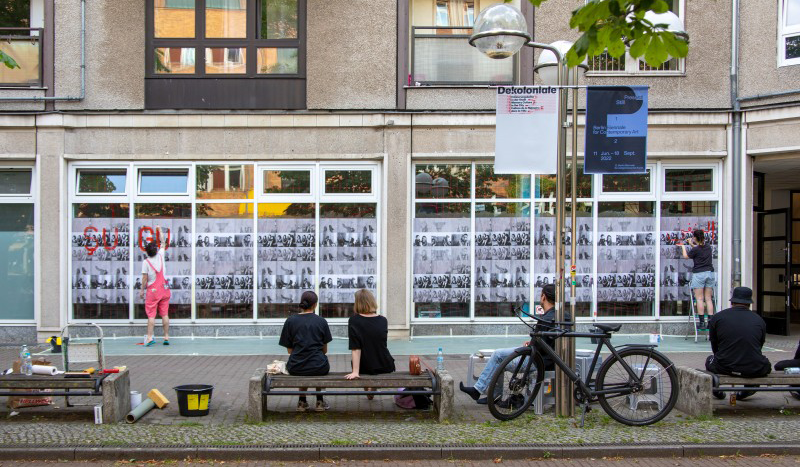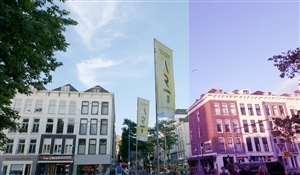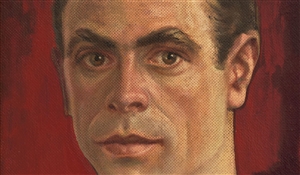Introduction to the Berlin Biennale and its 2022 Event
09 Aug 2022Introduction to the Berlin Biennale
Berlin Contemporary Art Biennale was founded on March 26, 1996, by Eberhard Mayntz and director of the KW Institute for Contemporary Art Klaus Biesenbach. Since then, Mayntz has been the chairman of the association's board. The basic idea of the event was formed based on acquaintance with Venice Biennale (1955). Presenting distinguished artworks, the Berlin Biennale became one of the most important international contemporary art communities.
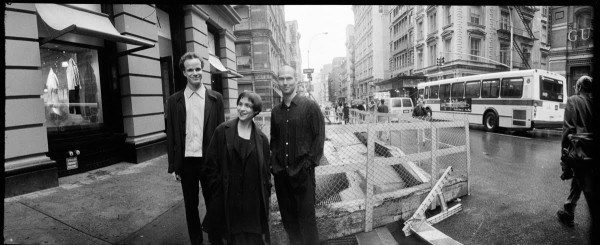
Hans Ulrich Obrist, Nancy Spector, and Klaus Biesenbach in the first Berlin Biennale | Image: Courtesy of Sylvia Plachy | Source: www.berlinbiennale.de
In 1998, Nancy Spector and Hans Ulrich Obrist were the curators of the first Berlin Biennale. Since 2004, the German Federal Cultural Foundation has financially supported the event as one of its "cultural institutions of excellence" and emphasizes its significance all over the country. From the beginning, the biennale was introduced as a global event since it aimed to exhibit various cultural trends. So it attracts a broad German and foreign audience.
Here are the directors of the previous generations of the Berlin Biennale:
-
2001: Saskia Bos
-
2004: Ute Meta Bauer
-
2006: Maurizio Cattelan
-
2008: Adam Szymczyk
-
2010: Kathrin Rhomberg
-
2012: Artur Zmijewski
-
2014: Juan A. Gaitán
-
2016: Lauren Boyle
-
2018: Gabi Ngcobo
-
2020: María Berríos
Berlin Biennale 2022
The 12th edition of the Berlin Biennale will run from June 11 to September 18, 2022, in different locations throughout Berlin. Kader Attia is the event's curator and Beatrice von Bismarck, Anita Dube, Krist Gruijthuijsen, Sohrab Mohebbi, Gabi Ngcobo, and Gabriela Rangel cooperate with him in the process of arranging the exhibition. The visual identity of the Berlin Biennale 2022 is designed by Martin Wecke. The event allows creative curators and emerging artists to present their innovative and experimental works and critically investigate other contemporary art movements. Additionally, participating in this show enables young artists to access international platforms of art. Kader Atia has set "colonialism" as the subject of this biennale edition. He has studied colonial interactions for two decades and has surveyed how colonialism has caused harm to art objects, individuals, and societies. He focuses on the concept of "repairment" amid destruction and considers it a method of cultural resistance. The dialectic between repairment and destruction provides society with a possibility to understand its history and identity. Atia wants the participants of the 12th edition of this event to produce works and study contemporary arts through a critical view.
Curators Workshop
This year, Kader Atia has invited Reem Shadid to arrange a ten-day workshop. Additionally, a group of 8 to 12 curators, instructors, and other experts are invited to participate in this workshop. The invited artists produce works on the subject of colonialism, and curators, lecturers, and other participants review them.
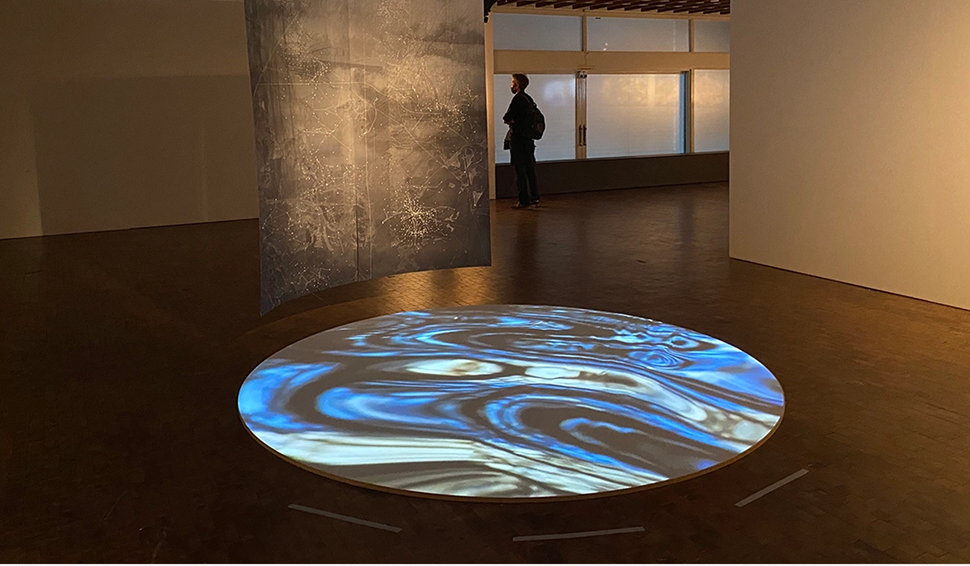
Imani Jacqueline Brown | What Remains at the Ends of the Earth? | 2022, Installation view | Photo Emily Watlington | Source: www.artnews.com
Exhibitions
Exhibitions arranged for the 12th edition of the Berlin Biennale present works by artists from all over the globe that address the emergency situation of the earth caused by the effects of modernity. Moreover, historical documents, including political publications, are displayed in the shows. The subject of these publications is the relationship between colonial, fascist, and imperial systems. They clarify the future strategies of colonialism which are focused on a series of questions. For instance,
-
How to form a colonial ecology?
-
Are the non-western feminism movements capable of playing a role in reconquering historical narratives?
-
Is it possible to discuss the robbery and retrieving of artworks?
Locations
Akademie der Künste, one of the locations at which the 12th edition of the Berlin Biennale will be held, is Berlin's academy of art founded in 1696 and focused on visual arts, architecture, music, literature, performing arts, film, and media.
The second location is called Museum für Gegenwart – Hamburger Bahnhof. In the mid-19th century, Hamburger Bahnhof was the terminal of the Hamburg-Berlin railway, but it was changed to the museum of transportation and technology in the early 20th century.
The KW Institute for Contemporary Art is another location of the event. It was initially an abandoned factory, but it was transformed into a dynamic center for contemporary art in the early 20th century.
Freunde
Freunde is a network of art enthusiasts, curators, and artists that enables its audience access to the Berlin Contemporary Art Biennale and contributes to the multifaceted cultural life in Berlin. Freunde provides financial and public affairs support for the KW Institute for Contemporary Art and the Berlin Biennale. The financial aid fully transferred to the two institutes comes from the membership fee paid by the audience. Those who join Freunde will benefit from the following features, among many others:
-
Free entrance to all exhibitions of KW and Berlin Biennale
-
Invitation to all previews and exhibition openings of KW and the Berlin Biennale
-
Exclusive guided tours and talks with artists and curators
-
Selected art trips and excursions
-
10 percent discount on all KW publications and editions
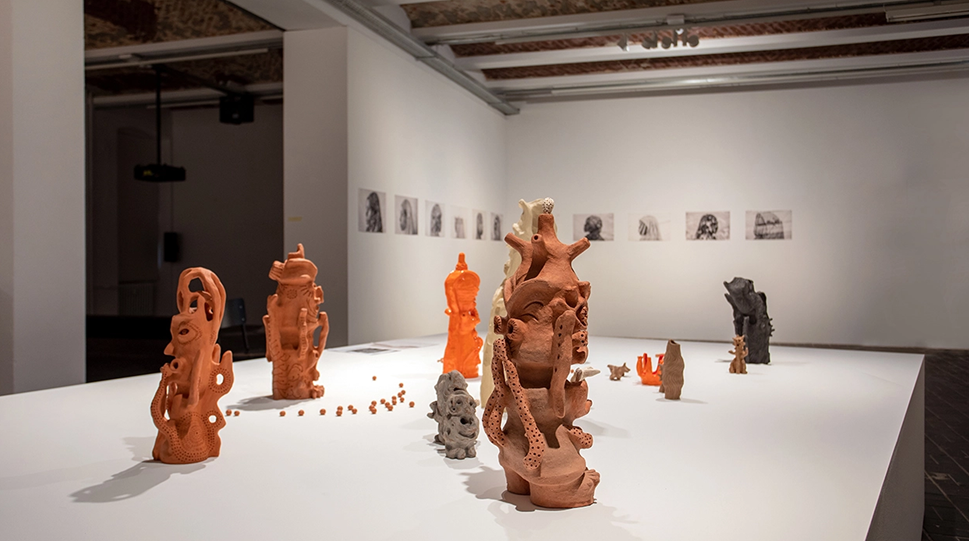
Mai Nguyễn-Long | Vomit Girl (Berlin Cluster) | 2022.PHOTO SILKE BRIEL | Source: www.artnews.com
Programs
The 12th edition of the Berlin Biennale has arranged a comprehensive program for its audience. Besides tours, workshops, performances, and screening films, a series of conferences will investigate how colonialism and imperialism keep operating in the present time. Here is a list of the programs:
-
Free tours for visiting art spaces with a limited number of participants
-
The live execution of a mural by Myriam El HaÏk on Thursdays, accompanied by playing the piano to break the boundaries of time and space.
-
Going to the wooden library where books made of trees are stored. The audience will face the question that if the trees are unhappy with this process, how can we read books, and to whom should we return them? Fabiola performs this program.
-
A conference about the colonial unconscious of European countries' imperialism in 1991 that had decided to move their toxic dump to the third world countries to keep their own lands clean.
-
A conference titled "Who is Universal?" that criticizes racial and social class discrimination.
-
A conference titled "Individual and Collective Resistance of Women During the Shoah" with Zuzanna Hertzberg as the presenter.
-
A conference titled "Tracing De/Colonial Contours" with Nene Opoku as the presenter.
Source, and cover and slider image:
- www.berlinbiennale.de



